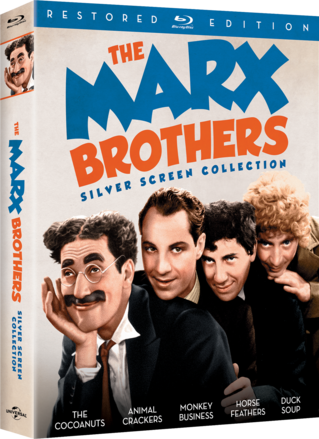

The Marx Brothers' cinematic template got refined over the years, for better and worse, but it's pretty well formed to begin with in their 1929 debut The Cocoanuts. That's because the brothers had already been performing as a team for about fifteen years, and performing The Cocoanuts since 1925. The hit Broadway musical was irresistible material to a Hollywood hungry for performers to populate the burgeoning sound era of films, and so Groucho, Chico, Harpo, and Zeppo became movie stars in the employ of Paramount Pictures.
Groucho plays Hammer, the deadbeat proprietor of Florida's seaside resort Hotel de Cocoanut. Zeppo plays his lazy lieutenant Jamison, and Chico and Harpo two thieving tramps who show up with empty luggage they hope to fill. Morrie Ryskind's adaptation of George S. Kaufman's musical "book" establishes the basic pattern of Groucho as fast-talking shyster, Chico as ethnic halfwit, and Harpo as puckish clown—all three being girlchasers, sometimes literally. Many specific character traits and gags get their first big-screen airing here, as well, like Harpo's business of slipping his leg into someone's hand, pickpocketing and cramming his overcoat with valuables, and eating like a goat. Harpo also demonstrates where he got his name with a harp solo sequence (he also plays the clarinet here), and Chico shoots the keys for the first time on screen in a piano solo (Victor Herbert's "Gypsy Love Song").
As for Groucho, he launches the picture—never mind the opening song—with a dizzying outlay of wisecracks directed at his unpaid bellboys and bellgirls (more of the latter, the better for chorus lines). This scene gets something of a bookend in an auction monologue near the film's end, but The Cocoanuts' best-remembered scene is one of Groucho and Chico's patented dialogues in which the former troubleshoots the bemusement of the latter: the "Why a duck?" routine. The Florida land boom serves as the impetus for the film's low-level intrigue, a piddling threat to the unexceptional ingénues (Mary Eaton and Oscar Shaw) from a couple of unexceptional villains (Cyril Ring's cad and Kay Francis' vamp)—all stock characters that will recur in typical Marx Brothers plots. The most important stock character, though, is the dowager—in this case Mrs. Potter (Margaret Dumont, Groucho's perfect foil in seven films).
Of course, The Cocoanuts is a musical, after all, and one with music and lyrics by Irving Berlin, no less. The most prominent lyrical numbers are the pretty romantic duet "When My Dreams Come True" and the dance-themed "Monkey Doodle Doo," though there's also a dance for "The Bell Hops" and a song for Basil Ruysdael's stuffed shirt Detective Hennessey, a comically mock-important "Tale of the Shirt" set to Bizet's Carmen. While pleasant enough, the songs can't hold a candle to (or leave one burning in the window for) the film's comedy, its sophisticated absurdity and sublime nonsense. The verbal wit (including peerless puns), physical comedy, and farcical door-slamming sequence prove as practiced as Groucho's application of his greasepaint moustache and eyebrows. But there's also an improvisational looseness and relaxed ease that, even in the first go in front of the camera, marks the Marxes as stars.

|
|
 |
Universal has gifted fans with The Marx Brothers' Blu-ray debut in the three-disc The Marx Brothers Silver Screen Collection Restored Blu-ray Edition . The main review page linked here details the set's bonus features and link to reviews of the other films.
The Cocoanuts has never looked or sounded better on home video than it does in the new set. That said, this early sound film has its issues. While Universal has apparently used the print in the UCLA Archive that's considered the best available, large sections of the film show noticeably poorer picture quality. At its best, the picture looks clean and well-resolved, with proper contrast and more detail than it's ever been afforded on disc. In the problematic sections, the image is washed out and extremely soft: these include the first appearance of Detective Hennessey and a good portion of the auction sequence.
Sound comes in DTS-HD Master Audio 2.0 that maximizes the available mono elements. Sound recording was still in its early days, and that's evident in even this best-yet presentation of The Cocoanuts. Digital tools have softened the harshness of some of the film's inherent sound problems (like hiss, crackle, and pops) and, in some cases, removed them, while the overall balance of elements has been improved.
The Cocoanuts also gets one film-specific bonus feature, a scholarly commentary by film scholar Anthony Slide. Kudos to Universal for springing for these commentaries, which do a great job of contextualizing each film in the Marx Brothers' career, addressing the film's specific development and production and reception, and providing biographical information about the cast and crew of each film.
 |